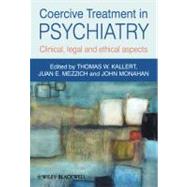
Note: Supplemental materials are not guaranteed with Rental or Used book purchases.
Purchase Benefits
What is included with this book?
Dr. Mezzich was Chair of the World Psychiatric Association (WPA) Section on Classification and Diagnostic Assessment, and a member of the ICD-10 Mental Disorders Workgroup and the DSM-IV Task Force. He has authored over 200 scientific journal articles and book chapters and 25 books and monographs primarily on psychiatric diagnosis and epidemiology from clinical, philosophical, statistical, and cultural perspectives and more recently on person-centered psychiatry and medicine. He has received six Honorary Doctorates from universities in the Americas and Europe as well as the Simon Bolivar Award of the American Psychiatric Association, the Medal for Extraordinary Merit of the Medical Council of Peru, and the Linneaus Medal of Uppsala University in Sweden. He is President of the InternationalNetwork for Person-centered Medicine.
Professor Monahan is well known internationally for his numerous publications and presentations in mental health law, for his leadership of the MacArthur Research Network on Violence, Coercion and Competence and of the current MacArthur Research Network on Mandated Treatment in the Community, and for his generous support and encouragement of scholars in coercion and in all areas of mental health law.
| List of Contributors | p. vii |
| Introduction | p. xi |
| Conceptual and clinical aspects of coercive treatment | p. 1 |
| Person-centred psychiatry perspectives on coercion and cooperation | p. 3 |
| Coercive treatment and stigma - is there a link? | p. 13 |
| Mandated psychiatric treatment in the community - forms, prevalence, outcomes and controversies | p. 33 |
| Is it possible to define a best practice standard for coercive treatment in psychiatry? | p. 49 |
| How to de-escalate a risk situation to avoid the use of coercion | p. 57 |
| Legal aspects of coercive treatment | p. 81 |
| Psychiatry and the law - do the fields agree in their views on coercive treatment? | p. 83 |
| Reducing discrimination in mental health law - the 'fusion' of incapacity and mental health legislation | p. 97 |
| Mental health care and patients' rights - are these two fields currently compatible? | p. 121 |
| Ethical aspects of coercive treatment | p. 151 |
| Cross-cultural perspectives on coercive treatment in psychiatry | p. 153 |
| Historical injustice in psychiatry with examples from Nazi Germany and others û ethical lessons for the modern professional | p. 161 |
| Paternalism in mental health - when boots are superior to Pushkin | p. 175 |
| Users' views on coercive treatment | p. 185 |
| The moral imperative for dialogue with organizations of survivors of coerced psychiatric human rights violations | p. 187 |
| Resisting variables - service user/survivor perspectives on researching coercion | p. 213 |
| Seventy years of coercion in psychiatric institutions, experienced and witnessed | p. 235 |
| Coercion - point, perception, process | p. 245 |
| Coercion and undue influence in decisions to participate in psychiatric research | p. 269 |
| Ethical issues of participating in psychiatric research on coercion | p. 271 |
| Coercion and undue influence in decisions to participate in psychiatric research | p. 293 |
| Index | p. 315 |
| Table of Contents provided by Ingram. All Rights Reserved. |
The New copy of this book will include any supplemental materials advertised. Please check the title of the book to determine if it should include any access cards, study guides, lab manuals, CDs, etc.
The Used, Rental and eBook copies of this book are not guaranteed to include any supplemental materials. Typically, only the book itself is included. This is true even if the title states it includes any access cards, study guides, lab manuals, CDs, etc.